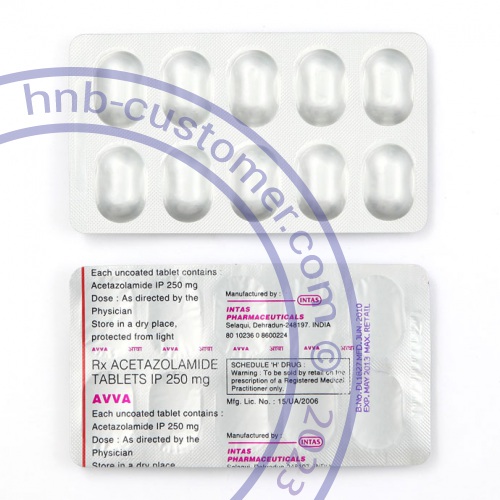

Brand(s):
- Avva
Manufacturer:
- Intas Pharmaceuticals Ltd.
Disease(s):
- Glaucoma / Mountain Sickness
Known as:
- Ak-Zol / AZM-Tab / Dazamide / Diamox / Storzolamide
- We can ship our products to any location worldwide
- Enjoy complete anonymity and robust data security measures
- Exclusive certified products at compelling prices
- Skip the hassle of long queues; get your medicines hassle-free
Diamox
acetazolamide
| Package | Per tablet | Price | Savings | Order |
|---|---|---|---|---|
|
360 tablets
Free AirMail shipping
|
$ 0.69
|
$ 249.95 $ 0.69 Per tablet
|
$ 229.45
|
|
|
180 tablets
|
$ 0.72
|
$ 129.95 $ 0.72 Per tablet
|
$ 109.75
|
|
|
120 tablets
|
$ 0.83
|
$ 99.95 $ 0.83 Per tablet
|
$ 59.85
|
|
|
90 tablets
|
$ 0.89
|
$ 79.95 $ 0.89 Per tablet
|
$ 39.90
|
|
|
60 tablets
|
$ 0.93
|
$ 55.95 $ 0.93 Per tablet
|
$ 23.95
|
|
|
30 tablets
|
$ 1.33
|
$ 39.95 $ 1.33 Per tablet
|
|


Brand(s):
- Avva
Manufacturer:
- Intas Pharmaceuticals Ltd.
Disease(s):
- Glaucoma / Mountain Sickness
Known as:
- Ak-Zol / AZM-Tab / Dazamide / Diamox / Storzolamide
Acetazolamide Tablets: A Comprehensive Guide
What is Acetazolamide?
Acetazolamide is a medication primarily used to treat glaucoma (a condition causing increased pressure in the eye) and certain types of seizure disorders. It also finds application in managing edema (swelling) resulting from heart failure or other medications. Furthermore, acetazolamide is used both to treat and prevent altitude sickness, a common ailment experienced at high elevations.
Important Considerations Before Taking Acetazolamide
Before starting acetazolamide, it's crucial to inform your healthcare provider about any pre-existing medical conditions. This includes:
- Diabetes: Acetazolamide can affect blood sugar levels.
- Kidney disease: The kidneys play a vital role in processing this medication, and impaired kidney function may necessitate dosage adjustments.
- Liver disease: The liver also processes acetazolamide; liver problems can impact its metabolism and effectiveness.
- Lung disease: Acetazolamide may exacerbate certain lung conditions.
- Allergies: Any prior allergic reactions to acetazolamide, sulfa drugs, other medications, foods, dyes, or preservatives should be disclosed to your doctor.
- Pregnancy and breastfeeding: Acetazolamide may pose risks during pregnancy and breastfeeding, so discuss these considerations with your doctor.
How to Take Acetazolamide
Acetazolamide is administered orally, with a glass of water. If stomach upset occurs, taking it with food may help. Maintain a consistent dosing schedule, as prescribed by your doctor. Do not adjust the dosage or discontinue the medication without consulting your physician.
Children require special considerations, and parents should consult their pediatrician before administering acetazolamide to their children. Individuals over 65 may be more sensitive to its effects and might require a lower dose. In case of an overdose, immediately contact a poison control center or emergency room.
Remember: This medication is for personal use only; do not share it with others.
What if I Miss a Dose?
If a dose is missed, take it as soon as possible. However, if it's almost time for the next scheduled dose, skip the missed dose and continue with the regular schedule. Avoid doubling up on doses.
Potential Drug Interactions
Acetazolamide should not be taken with methazolamide. It can also interact with several other medications, including:
- Aspirin and aspirin-like medicines
- Cyclosporine
- Lithium
- Diabetes medications
- Methenamine
- Other diuretics
- Phenytoin
- Primidone
- Quinidine
- Sodium bicarbonate
- Stimulant medications like dextroamphetamine
This is not an exhaustive list of potential interactions. Provide your doctor with a complete list of all medications, herbs, over-the-counter drugs, and dietary supplements you are currently using. Also inform them of your alcohol consumption, smoking habits, and use of illicit substances, as these factors can affect medication efficacy and interactions.
Monitoring Your Health While on Acetazolamide
Regular check-ups with your doctor are necessary to monitor your progress while taking acetazolamide. This typically includes regular blood tests. Diabetic patients should monitor their blood sugar levels as directed. A specific diet may be recommended; consult your doctor for guidance. Adequate fluid intake is crucial to prevent dehydration.
Drowsiness and dizziness are possible side effects. Refrain from driving, operating machinery, or engaging in activities requiring alertness until you understand how the medication impacts you. Sudden changes in posture (sitting or standing) should be avoided, especially in older adults, to minimize the risk of dizziness or fainting.
Acetazolamide can increase sun sensitivity. Limit sun exposure, wear protective clothing and sunscreen when outdoors, and avoid tanning beds or sun lamps.
Possible Side Effects
Side effects requiring immediate medical attention:
- Allergic reactions (skin rash, itching, hives, facial swelling)
- Breathing difficulties
- Confusion or depression
- Dark urine
- Fever
- Numbness or tingling in extremities
- Skin redness, blistering, peeling, or loosening (including inside the mouth)
- Ringing in the ears (tinnitus)
- Seizures
- Unusual weakness or fatigue
- Yellowing of the eyes or skin (jaundice)
Side effects that usually don't require medical attention (but report to your doctor if persistent or bothersome):
- Altered taste
- Diarrhea
- Headache
- Loss of appetite
- Nausea or vomiting
- Increased urination
This list may not include all possible side effects.
Storage Instructions
Keep acetazolamide out of the reach of children. Store at room temperature (68-77°F or 20-25°C). Discard any unused medication after the expiration date.
```









